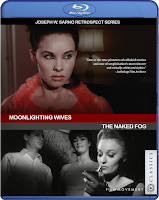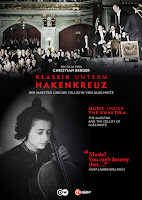the traveler's resource guide to festivals & films
a FestivalTravelNetwork.com site
part of Insider Media llc.
May '23 Digital Week I
- Details
- Parent Category: Film and the Arts
- Category: Reviews
- Published on Wednesday, 03 May 2023 12:51
- Written by Kevin Filipski
Four Quartets
(Kino Lorber)
Actor Ralph Fiennes could recite from the phone book and make it riveting, so it’s no surprise that his recitation of T.S. Eliot’s set of poems, “Four Quartets,” is a colossal achievement, meaningful and animated throughout.
Weirdly, though, his sister Sophie Fiennes, who directs, doesn’t think her brother speaking grippingly is enough to hold our interest for 84 minutes, so she keeps cutting to nicely photographed outdoor scenes that not only don’t complement the words but end up separating us from them. Ralph, and Eliot, come off brilliantly at least.
(Film Movement)
Japanese director Naomi Kawase, who sometimes wavers in her sentimentality and contrived plotting, made this memorable film in 2017, about a young woman who crates audio descriptions for films who begins a strange but intimate relationship with a photographer who’s nearly lost his sight.
The contrivance of their meeting and becoming close isn’t an issue when it’s been so compellingly and poetically rendered by Kawase, with formidable performances by Ayame Misaki and Masatoshi Nagase that give a sense of bittersweet melancholy.
Ariadne auf Naxos
(Dynamic)
Richard Strauss’ sidesplitting comic opera about a composer’s serious theatrical work being ruined by the burlesque that will be performed simultaneously—on orders from the richest man in Vienna, whose dinner party has run too long. Too bad that Matthias Hartmann’s messy 2022 Florence, Italy, staging seems more confused than the characters in the opera.
Happily, Strauss’ remarkable music comes to the rescue, played by the orchestra under conductor Daniele Gatti, and sung marvelously by Sophie Koch (composer), Krassimira Stoyanova (Ariadne) and even, in the punishing tenor role, A.J. Glueckert. There’s first-rate hi-def video and audio.
(Warner Bros)
The final season of HBO’s fantasy series—based on The Amber Spyglass, the third novel in Philip Pullman’s winning trilogy—satisfyingly wraps up the cosmic adventures of teens Lyra and Will, who must travel where no one has returned from in order to save multiple worlds—and each other.
As always, there are visually thrilling moments, especially the fantastical scenes with anthropomorphic beasts. Maybe because it’s the higher stakes, but this season hits more directly than the earlier two, which were technically impeccable but emotionally distant. All eight episodes look spectacular in hi-def.
(Lionsgate)
The true story of a group of young men and women led by a charismatic “savior” that starts a counterrevolution of believers in the late 60s and early 70s has become an engaging drama by the people who earlier made less interesting artifacts as I Can Only Imagine and I Still Believe. Directors Jon Erwin and Brent McCorkle and writers Erwin and Jon Gunn have made a movie that doesn’t bludgeon you over the head with its smugness—at least until the end.
The fine acting from Kelsey Grammer, Kimberly Williams-Paisley, Joel Courtney, Anna Grace Barlow and Jonathan Roumie (as the Christ-like leader) is a plus. There’s a good hi-def transfer; the extras—interviews with the filmmakers and cast members, an audio commentary and deleted scenes—are where the sanctimony really goes overboard.
(Film Movement Classics)
Among director Joseph W. Sarno’s would-be titillating features are a pair of 1966 features—Moonlighting Wives and The Naked Fog—making up a set that’s more historically than cinematically interesting. Wives (in color) and Fog (in B&W) contain many naked female breasts that, for some viewers, might compensate for the shallow acting, paper-thin plotting and threadbare characterizations.
The hi-def transfers look OK, although there’s still much visual noise; extras comprise a Wives commentary by film historian Tim Lucas and interviews with Sarno (2006) and cinematographer Jerry Kalogeratos (2007).
Music Under the Swastika—The Maestro and the Cellist of Auschwitz
(C Major)
The awful contradiction between the lip service the Nazis paid to high culture (especially music and musicians) and their heinous acts of wholesale slaughter is explored in Christian Berger’s insightful documentary that contrasts esteemed conductor Wilhelm Furtwangler—whose reputation was soiled by being a useful idiot for Himmler and his cohorts—and one who paid dearly: Anita Lasker-Wallfisch, a Jewish musician taken to Auschwitz and cellist of the women’s camp orchestra.
Plentiful and often moving interviews with Lasker-Wallfisch, along with music writer Norman Lebrecht, conductors Daniel Barenboim and Christian Thielemann and others provide necessary context and testimony that makes this a valuable historical document.
1923
(BR Klassik)
At first glance, the four works on this fine new disc—Ernst Toch’s Dance Suite, Kurt Weill’s Seven Medieval Poems, Ernst Krenek’s three mixed choruses a cappella, and Bela Bartok’s Dance Suite—seem to have little in common except the year they were composed. But that’s part of the point: these are works of astonishing variety and virtuosity by a quartet of European composers who were at the peak of their powers; they make demands on both instrumentalists and singers that shows their ability to consolidate old forms or create new ones.
Soloists and members of the Bavarian Radio Chorus and Orchestra enthusiastically play these works as if they were just written, not created a century ago in response to political, social and economic developments of the time.
(Chandos)
Russia’s Mieczysław Weinberg (1919-96) never witnessed his musical renaissance, which began when his shattering Holocaust opera The Passenger started being performed worldwide and dozens of CDs of his varied orchestral and chamber music was recorded, much of it in the past decade and a half. His 17 string quartets make up a formidable body of work much like his compatriot Dmitri Shostakovich’s 15, and this recording, by the gifted Arcadia Quartet, shows Weinberg in his early and late periods.
The fourth quartet presents a composer still finding his unique voice in this medium, although its passionate writing is pure Weinberg. But the 16th and penultimate of Weinberg’s quartets is something else again, an eloquent if demanding work that finds an artist in complete control.
Newsletter Sign Up

Upcoming Events
No Calendar Events Found or Calendar not set to Public.















